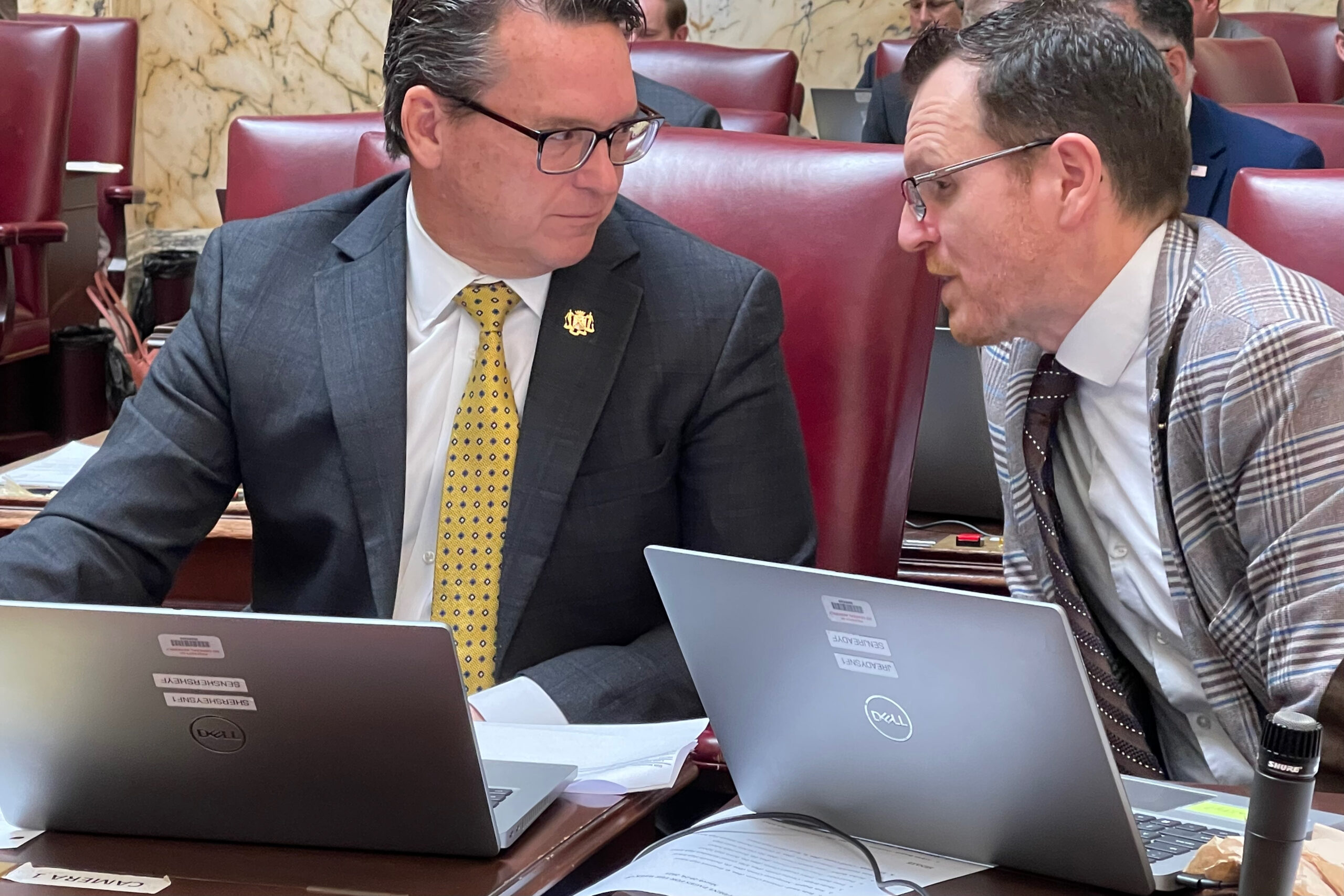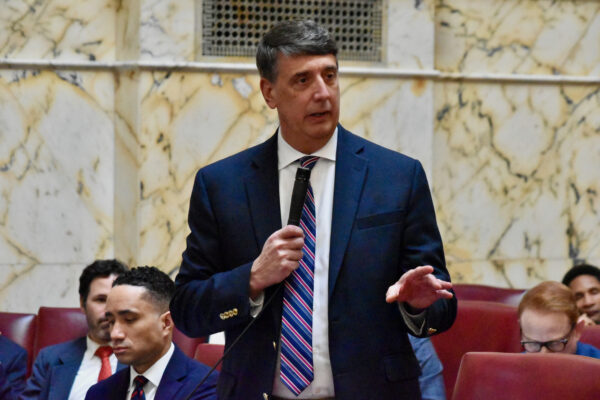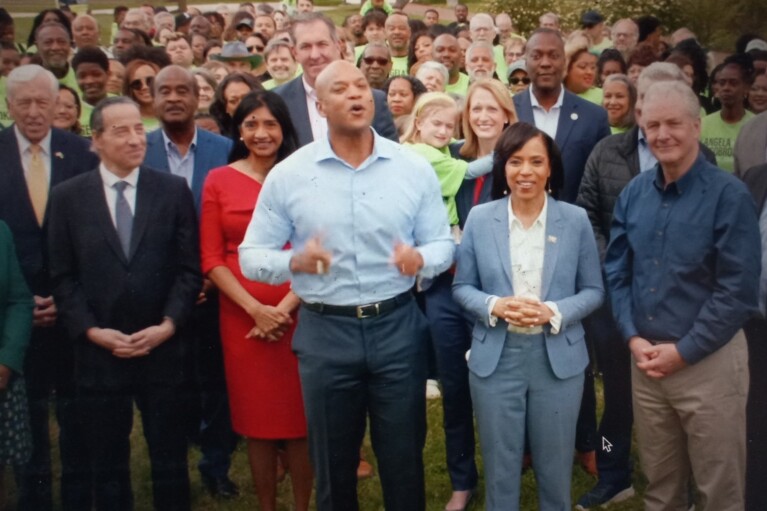Republicans seek gas tax consistency, Democrats warn of a reckoning

Senate Democrats warned of a transportation funding reckoning Monday as they rejected an effort to end automatic gas tax increases.
Democratic lawmakers in recent weeks have shown a desire to avoid linking certain future increases to inflation. The House and Senate both recently passed legislation to accelerate the state’s move to a $15 per hour minimum wage. But both chambers stripped out a provision favored by Gov. Wes Moore (D) that would have imposed annual automatic minimum wage increases tied to inflation.
Republicans led by Minority Leader Stephen S. Hershey Jr. (R-Upper Shore) — and joined by a handful of Democrats — pushed Monday for a consistent policy on inflation-related increases that included the gas tax.
During a debate on transit fares in the state, Hershey said he thought “it was important that we be somewhat equitable as far as what we’re doing with the fare box recovery and the fares for mass transit and the fuel tax. If changes need to be made I think it’s incumbent on the General Assembly to do such.”
Hershey’s amendment was similar to bills that are stalled in House and Senate committees.
Hershey proposed the amendment as the Senate was set to give preliminary approval to Senate Bill 617. The legislation would change how fares for mass transit are set, including ending an automatic increase tied to inflation.
Democratic leaders called for Hershey’s amendment to be rejected, saying it was not the time to consider such action.

Senate Budget and Taxation Chair Sen. Guy Guzzone (D-Howard). File photo by Bryan P. Sears.
“Believe it or not, I actually appreciate this discussion,” said Budget and Taxation Committee Chair Guy Guzzone (D-Howard) as he urged his colleagues to reject the proposed amendment. “I think it’s one we need to have. It’s one that we need to have over the next year or two. The gas tax itself is not going to be enough, quite frankly, because of the nature of new vehicles, to accommodate the needs that we have. This is a critical problem.”
Guzzone and Senate President Bill Ferguson (D-Baltimore City) have been increasingly more vocal this session, warning of a need to rethink how the state funds road and bridge construction and repair as cleaner vehicles reduce dependence on gas. That decrease will eventually affect the state’s Transportation Trust Fund.
“I believe we’re going to have some tough decisions ahead of us,” said Guzzone.
To that end, separate legislation now calls for the creation of a blue ribbon panel that will begin looking at how projects could be funded as gas tax revenue dries up.
This year, about $400 million in general funds are being used “to subsidize transportation,” Ferguson said.
“That was never how it was envisioned,” he said. “The transportation lockbox was to protect transportation expenditures. This is going to be a very very real and hard conversation moving forward.”
The Senate voted largely along party lines to reject Hershey’s amendment. Joining the Senate’s 13 Republicans were five Democrats in relatively competitive districts — Sens. Katie Fry Hester (D-Howard); Kathy Klausmeier (D-Baltimore County); and Pam Beidle, Sarah Elfreth, and Dawn Gile, who all represent Anne Arundel.
A similar debate took place last week when the House version of the transit funding bill was on the floor. An unsuccessful Republican amendment on the gas tax drew two Democratic supporters.
This is not the first effort Republicans have made to end automatic inflationary increases to the gas tax.
The legislature voted to tie future annual increases to inflation when it voted in 2013 to increase the gas tax for the first time in 20 years. Only seven current senators were in the General Assembly when it passed the increase and tied it to inflation.
In part, the formula links annual inflation increases for the period that ends each April 30. That rate does not decrease in the event of negative inflation. The inflation-related increase for the coming year could be about 8%.
Inflation reached 40-year highs over the last year. The spike pushed the state excise tax from 36.1 cents to 42.7 cents per gallon starting last July 1.
Republicans pushed to decouple the rate last year. Eventually, then-Gov. Larry Hogan (R) was able to impose a 30-day gas tax holiday. He offset the lost revenue using a portion of the state budget surplus.
The vote came at the same time the General Assembly created a lockbox for transportation funds. In previous years, then-Gov. Martin O’Malley (D) used some of the transportation cash to offset budget deficits driven by the Great Recession. Lawmakers at the time vowed the money in the trust fund would be sacrosanct, touchable only in an extreme fiscal emergency and with the approval of a supermajority of the General Assembly.
“We’re accountable for the tough decisions to raise taxes, raise gas taxes,” said Sen. Justin Ready (R-Carroll). “That’s what it should be. This [inflation index] allows us to just absolve ourselves of that responsibility.”




 Creative Commons Attribution
Creative Commons Attribution